Police Power to Arrest Analysis
VerifiedAdded on 2020/01/21
|11
|3797
|99
Essay
AI Summary
This essay provides a comprehensive analysis of the legal and regulatory framework governing police power to arrest in the UK. It examines the purposes and functions of this power, exploring the factors influencing and constraining the exercise of police discretion. The essay delves into the legal rules underpinning arrest, including the role of warrants and the Police and Criminal Evidence Act 1984. A critical analysis of 'cop culture' and its impact beyond the police station is also presented, considering both its positive and negative aspects in maintaining public order and reducing crime. The essay concludes by summarizing the key legal aspects of arrest and the complexities of police discretion in upholding the law while respecting individual rights.
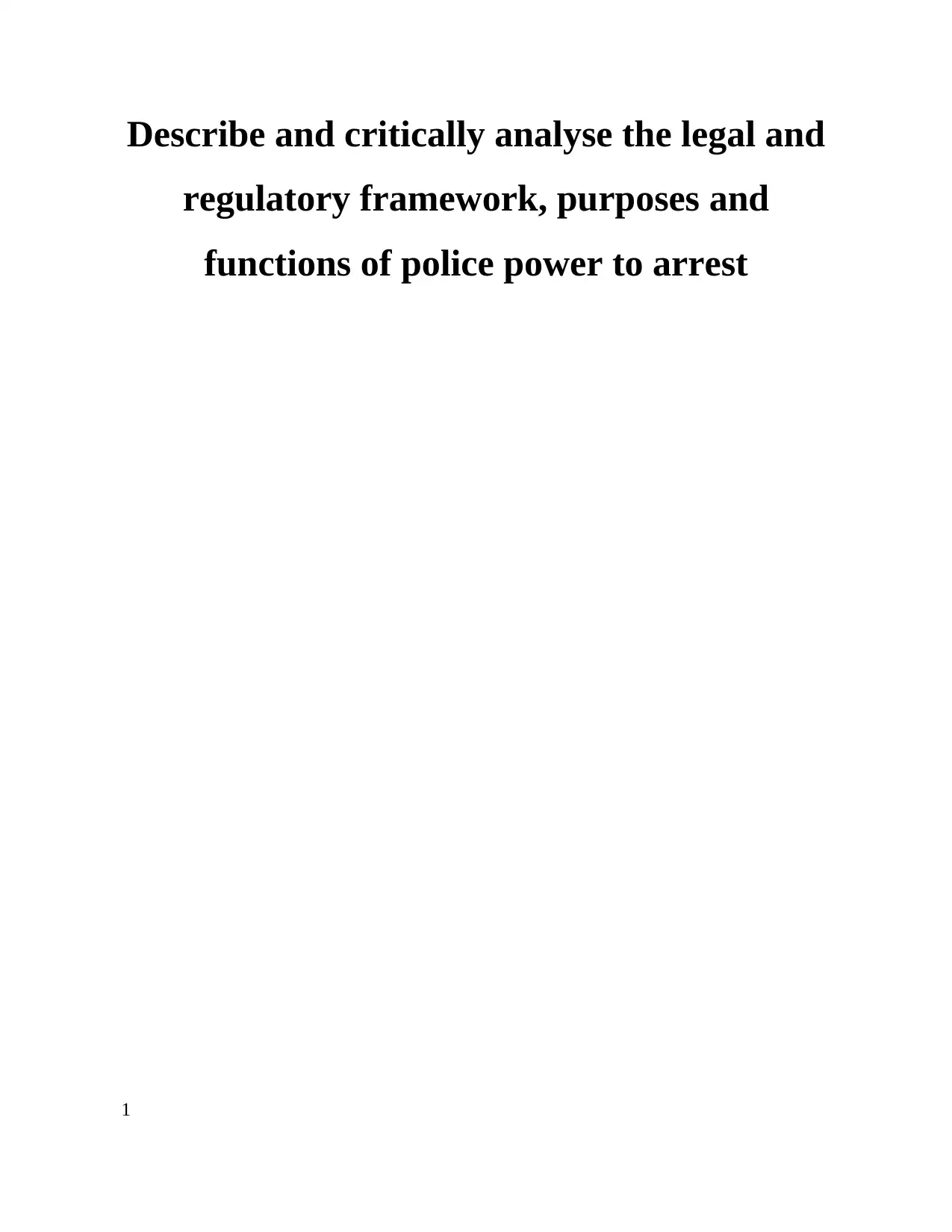
Describe and critically analyse the legal and
regulatory framework, purposes and
functions of police power to arrest
1
regulatory framework, purposes and
functions of police power to arrest
1
Paraphrase This Document
Need a fresh take? Get an instant paraphrase of this document with our AI Paraphraser
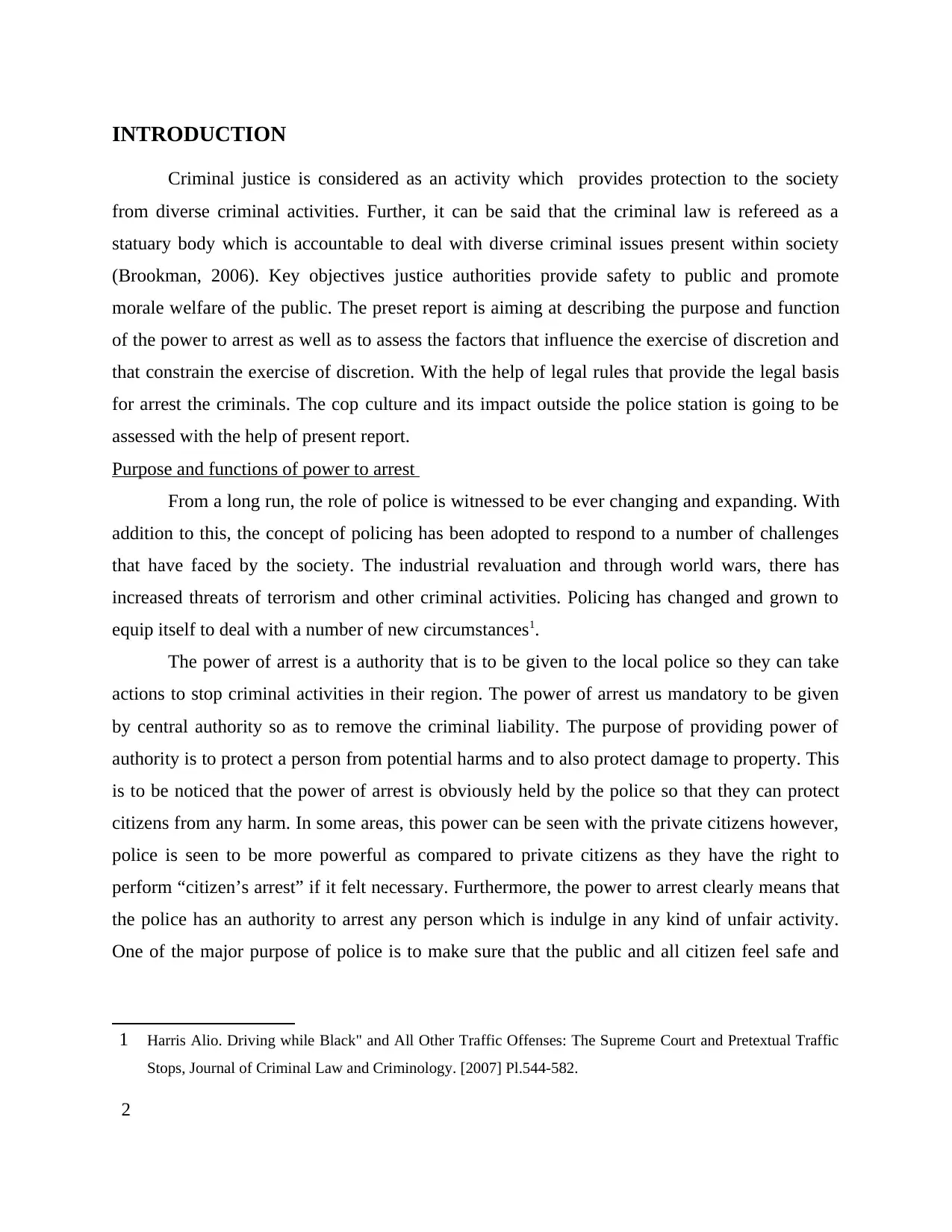
INTRODUCTION
Criminal justice is considered as an activity which provides protection to the society
from diverse criminal activities. Further, it can be said that the criminal law is refereed as a
statuary body which is accountable to deal with diverse criminal issues present within society
(Brookman, 2006). Key objectives justice authorities provide safety to public and promote
morale welfare of the public. The preset report is aiming at describing the purpose and function
of the power to arrest as well as to assess the factors that influence the exercise of discretion and
that constrain the exercise of discretion. With the help of legal rules that provide the legal basis
for arrest the criminals. The cop culture and its impact outside the police station is going to be
assessed with the help of present report.
Purpose and functions of power to arrest
From a long run, the role of police is witnessed to be ever changing and expanding. With
addition to this, the concept of policing has been adopted to respond to a number of challenges
that have faced by the society. The industrial revaluation and through world wars, there has
increased threats of terrorism and other criminal activities. Policing has changed and grown to
equip itself to deal with a number of new circumstances1.
The power of arrest is a authority that is to be given to the local police so they can take
actions to stop criminal activities in their region. The power of arrest us mandatory to be given
by central authority so as to remove the criminal liability. The purpose of providing power of
authority is to protect a person from potential harms and to also protect damage to property. This
is to be noticed that the power of arrest is obviously held by the police so that they can protect
citizens from any harm. In some areas, this power can be seen with the private citizens however,
police is seen to be more powerful as compared to private citizens as they have the right to
perform “citizen’s arrest” if it felt necessary. Furthermore, the power to arrest clearly means that
the police has an authority to arrest any person which is indulge in any kind of unfair activity.
One of the major purpose of police is to make sure that the public and all citizen feel safe and
1 Harris Alio. Driving while Black" and All Other Traffic Offenses: The Supreme Court and Pretextual Traffic
Stops, Journal of Criminal Law and Criminology. [2007] Pl.544-582.
2
Criminal justice is considered as an activity which provides protection to the society
from diverse criminal activities. Further, it can be said that the criminal law is refereed as a
statuary body which is accountable to deal with diverse criminal issues present within society
(Brookman, 2006). Key objectives justice authorities provide safety to public and promote
morale welfare of the public. The preset report is aiming at describing the purpose and function
of the power to arrest as well as to assess the factors that influence the exercise of discretion and
that constrain the exercise of discretion. With the help of legal rules that provide the legal basis
for arrest the criminals. The cop culture and its impact outside the police station is going to be
assessed with the help of present report.
Purpose and functions of power to arrest
From a long run, the role of police is witnessed to be ever changing and expanding. With
addition to this, the concept of policing has been adopted to respond to a number of challenges
that have faced by the society. The industrial revaluation and through world wars, there has
increased threats of terrorism and other criminal activities. Policing has changed and grown to
equip itself to deal with a number of new circumstances1.
The power of arrest is a authority that is to be given to the local police so they can take
actions to stop criminal activities in their region. The power of arrest us mandatory to be given
by central authority so as to remove the criminal liability. The purpose of providing power of
authority is to protect a person from potential harms and to also protect damage to property. This
is to be noticed that the power of arrest is obviously held by the police so that they can protect
citizens from any harm. In some areas, this power can be seen with the private citizens however,
police is seen to be more powerful as compared to private citizens as they have the right to
perform “citizen’s arrest” if it felt necessary. Furthermore, the power to arrest clearly means that
the police has an authority to arrest any person which is indulge in any kind of unfair activity.
One of the major purpose of police is to make sure that the public and all citizen feel safe and
1 Harris Alio. Driving while Black" and All Other Traffic Offenses: The Supreme Court and Pretextual Traffic
Stops, Journal of Criminal Law and Criminology. [2007] Pl.544-582.
2
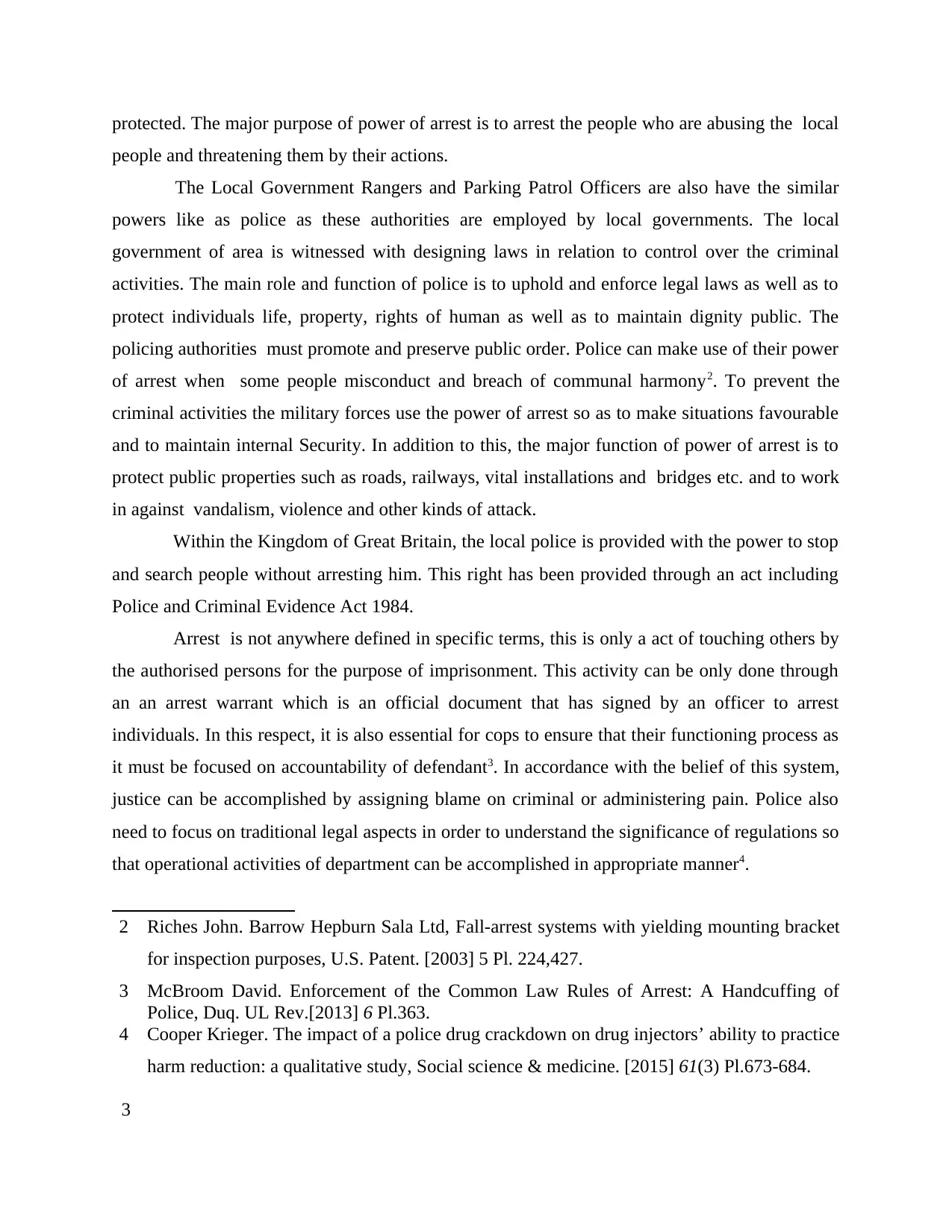
protected. The major purpose of power of arrest is to arrest the people who are abusing the local
people and threatening them by their actions.
The Local Government Rangers and Parking Patrol Officers are also have the similar
powers like as police as these authorities are employed by local governments. The local
government of area is witnessed with designing laws in relation to control over the criminal
activities. The main role and function of police is to uphold and enforce legal laws as well as to
protect individuals life, property, rights of human as well as to maintain dignity public. The
policing authorities must promote and preserve public order. Police can make use of their power
of arrest when some people misconduct and breach of communal harmony2. To prevent the
criminal activities the military forces use the power of arrest so as to make situations favourable
and to maintain internal Security. In addition to this, the major function of power of arrest is to
protect public properties such as roads, railways, vital installations and bridges etc. and to work
in against vandalism, violence and other kinds of attack.
Within the Kingdom of Great Britain, the local police is provided with the power to stop
and search people without arresting him. This right has been provided through an act including
Police and Criminal Evidence Act 1984.
Arrest is not anywhere defined in specific terms, this is only a act of touching others by
the authorised persons for the purpose of imprisonment. This activity can be only done through
an an arrest warrant which is an official document that has signed by an officer to arrest
individuals. In this respect, it is also essential for cops to ensure that their functioning process as
it must be focused on accountability of defendant3. In accordance with the belief of this system,
justice can be accomplished by assigning blame on criminal or administering pain. Police also
need to focus on traditional legal aspects in order to understand the significance of regulations so
that operational activities of department can be accomplished in appropriate manner4.
2 Riches John. Barrow Hepburn Sala Ltd, Fall-arrest systems with yielding mounting bracket
for inspection purposes, U.S. Patent. [2003] 5 Pl. 224,427.
3 McBroom David. Enforcement of the Common Law Rules of Arrest: A Handcuffing of
Police, Duq. UL Rev.[2013] 6 Pl.363.
4 Cooper Krieger. The impact of a police drug crackdown on drug injectors’ ability to practice
harm reduction: a qualitative study, Social science & medicine. [2015] 61(3) Pl.673-684.
3
people and threatening them by their actions.
The Local Government Rangers and Parking Patrol Officers are also have the similar
powers like as police as these authorities are employed by local governments. The local
government of area is witnessed with designing laws in relation to control over the criminal
activities. The main role and function of police is to uphold and enforce legal laws as well as to
protect individuals life, property, rights of human as well as to maintain dignity public. The
policing authorities must promote and preserve public order. Police can make use of their power
of arrest when some people misconduct and breach of communal harmony2. To prevent the
criminal activities the military forces use the power of arrest so as to make situations favourable
and to maintain internal Security. In addition to this, the major function of power of arrest is to
protect public properties such as roads, railways, vital installations and bridges etc. and to work
in against vandalism, violence and other kinds of attack.
Within the Kingdom of Great Britain, the local police is provided with the power to stop
and search people without arresting him. This right has been provided through an act including
Police and Criminal Evidence Act 1984.
Arrest is not anywhere defined in specific terms, this is only a act of touching others by
the authorised persons for the purpose of imprisonment. This activity can be only done through
an an arrest warrant which is an official document that has signed by an officer to arrest
individuals. In this respect, it is also essential for cops to ensure that their functioning process as
it must be focused on accountability of defendant3. In accordance with the belief of this system,
justice can be accomplished by assigning blame on criminal or administering pain. Police also
need to focus on traditional legal aspects in order to understand the significance of regulations so
that operational activities of department can be accomplished in appropriate manner4.
2 Riches John. Barrow Hepburn Sala Ltd, Fall-arrest systems with yielding mounting bracket
for inspection purposes, U.S. Patent. [2003] 5 Pl. 224,427.
3 McBroom David. Enforcement of the Common Law Rules of Arrest: A Handcuffing of
Police, Duq. UL Rev.[2013] 6 Pl.363.
4 Cooper Krieger. The impact of a police drug crackdown on drug injectors’ ability to practice
harm reduction: a qualitative study, Social science & medicine. [2015] 61(3) Pl.673-684.
3
⊘ This is a preview!⊘
Do you want full access?
Subscribe today to unlock all pages.

Trusted by 1+ million students worldwide
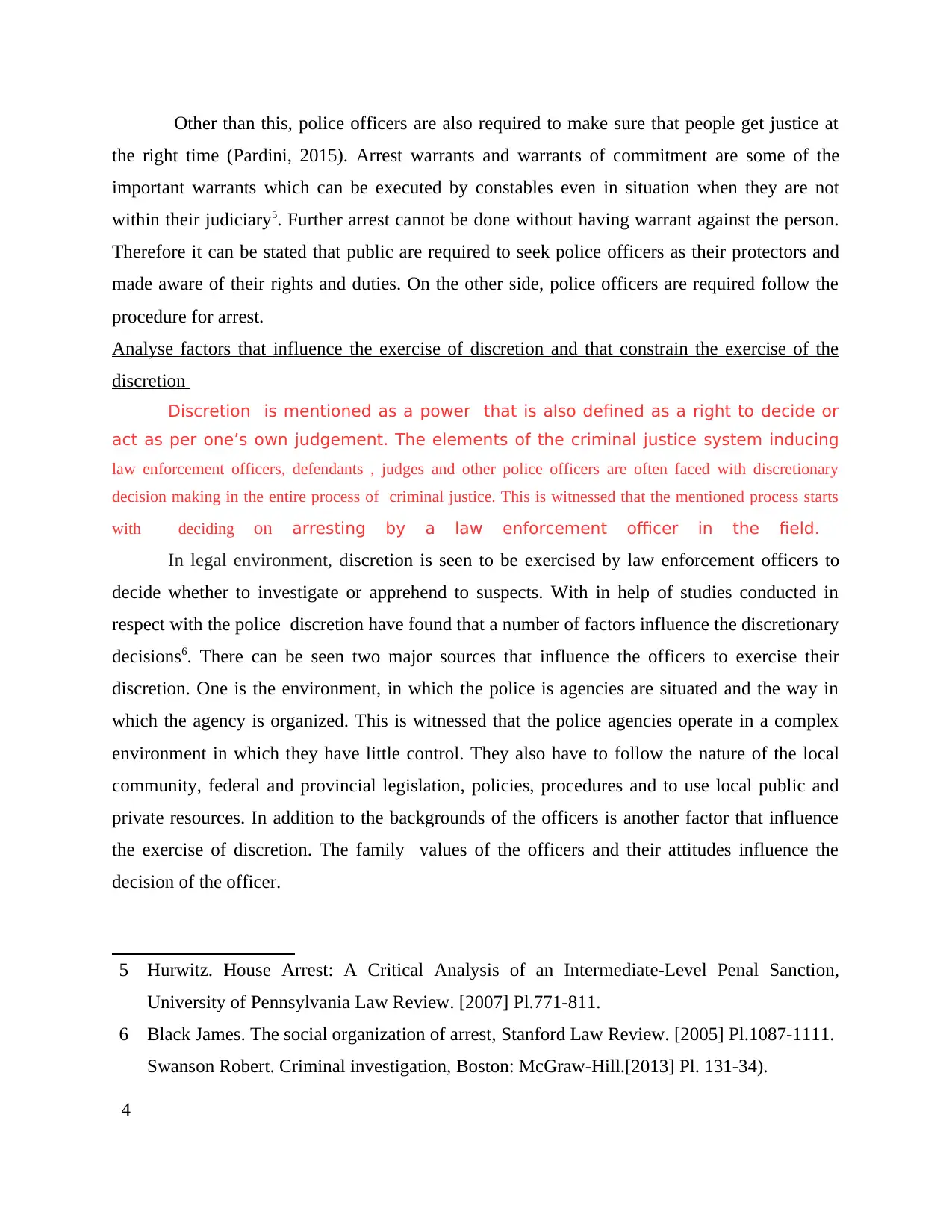
Other than this, police officers are also required to make sure that people get justice at
the right time (Pardini, 2015). Arrest warrants and warrants of commitment are some of the
important warrants which can be executed by constables even in situation when they are not
within their judiciary5. Further arrest cannot be done without having warrant against the person.
Therefore it can be stated that public are required to seek police officers as their protectors and
made aware of their rights and duties. On the other side, police officers are required follow the
procedure for arrest.
Analyse factors that influence the exercise of discretion and that constrain the exercise of the
discretion
Discretion is mentioned as a power that is also defined as a right to decide or
act as per one’s own judgement. The elements of the criminal justice system inducing
law enforcement officers, defendants , judges and other police officers are often faced with discretionary
decision making in the entire process of criminal justice. This is witnessed that the mentioned process starts
with deciding on arresting by a law enforcement officer in the field.
In legal environment, discretion is seen to be exercised by law enforcement officers to
decide whether to investigate or apprehend to suspects. With in help of studies conducted in
respect with the police discretion have found that a number of factors influence the discretionary
decisions6. There can be seen two major sources that influence the officers to exercise their
discretion. One is the environment, in which the police is agencies are situated and the way in
which the agency is organized. This is witnessed that the police agencies operate in a complex
environment in which they have little control. They also have to follow the nature of the local
community, federal and provincial legislation, policies, procedures and to use local public and
private resources. In addition to the backgrounds of the officers is another factor that influence
the exercise of discretion. The family values of the officers and their attitudes influence the
decision of the officer.
5 Hurwitz. House Arrest: A Critical Analysis of an Intermediate-Level Penal Sanction,
University of Pennsylvania Law Review. [2007] Pl.771-811.
6 Black James. The social organization of arrest, Stanford Law Review. [2005] Pl.1087-1111.
Swanson Robert. Criminal investigation, Boston: McGraw-Hill.[2013] Pl. 131-34).
4
the right time (Pardini, 2015). Arrest warrants and warrants of commitment are some of the
important warrants which can be executed by constables even in situation when they are not
within their judiciary5. Further arrest cannot be done without having warrant against the person.
Therefore it can be stated that public are required to seek police officers as their protectors and
made aware of their rights and duties. On the other side, police officers are required follow the
procedure for arrest.
Analyse factors that influence the exercise of discretion and that constrain the exercise of the
discretion
Discretion is mentioned as a power that is also defined as a right to decide or
act as per one’s own judgement. The elements of the criminal justice system inducing
law enforcement officers, defendants , judges and other police officers are often faced with discretionary
decision making in the entire process of criminal justice. This is witnessed that the mentioned process starts
with deciding on arresting by a law enforcement officer in the field.
In legal environment, discretion is seen to be exercised by law enforcement officers to
decide whether to investigate or apprehend to suspects. With in help of studies conducted in
respect with the police discretion have found that a number of factors influence the discretionary
decisions6. There can be seen two major sources that influence the officers to exercise their
discretion. One is the environment, in which the police is agencies are situated and the way in
which the agency is organized. This is witnessed that the police agencies operate in a complex
environment in which they have little control. They also have to follow the nature of the local
community, federal and provincial legislation, policies, procedures and to use local public and
private resources. In addition to the backgrounds of the officers is another factor that influence
the exercise of discretion. The family values of the officers and their attitudes influence the
decision of the officer.
5 Hurwitz. House Arrest: A Critical Analysis of an Intermediate-Level Penal Sanction,
University of Pennsylvania Law Review. [2007] Pl.771-811.
6 Black James. The social organization of arrest, Stanford Law Review. [2005] Pl.1087-1111.
Swanson Robert. Criminal investigation, Boston: McGraw-Hill.[2013] Pl. 131-34).
4
Paraphrase This Document
Need a fresh take? Get an instant paraphrase of this document with our AI Paraphraser
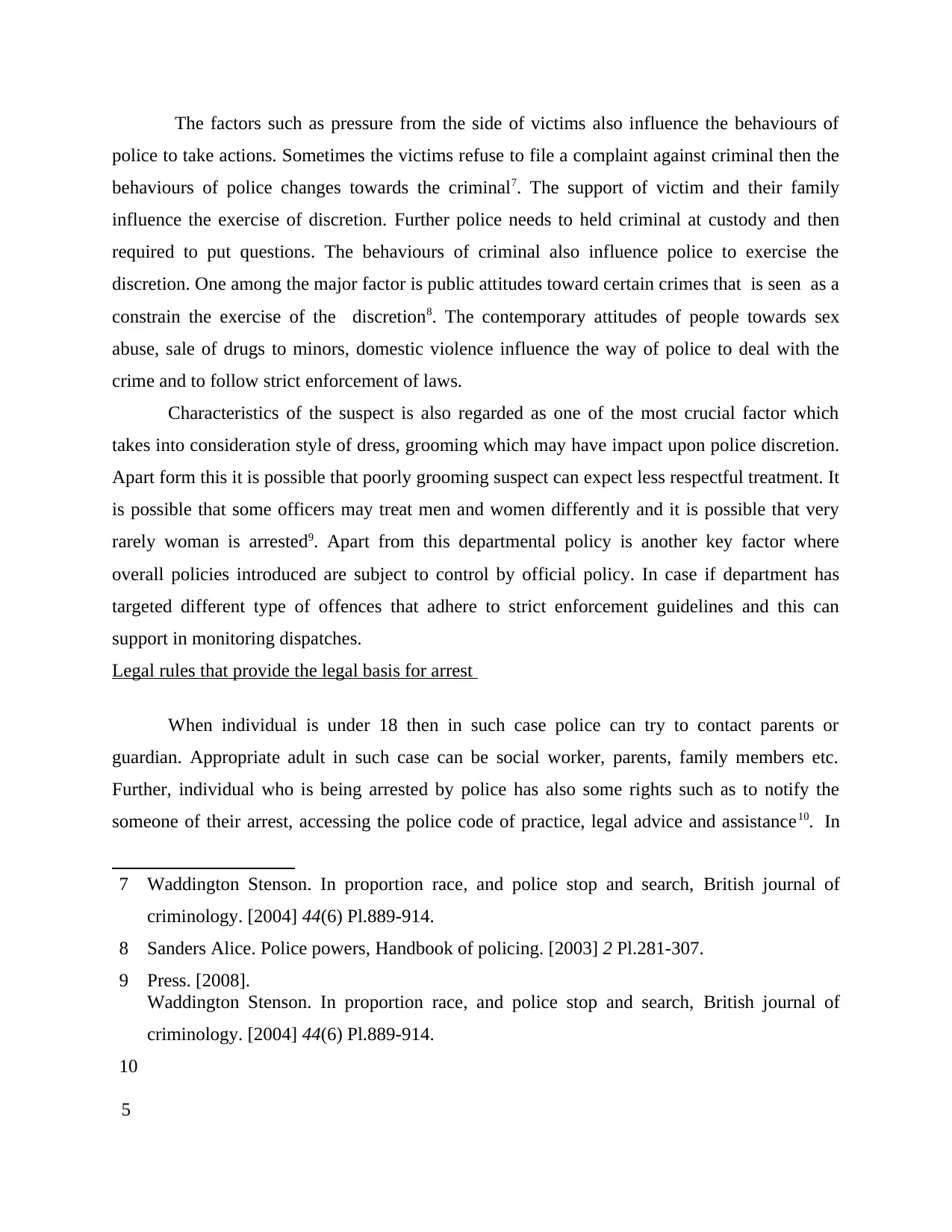
The factors such as pressure from the side of victims also influence the behaviours of
police to take actions. Sometimes the victims refuse to file a complaint against criminal then the
behaviours of police changes towards the criminal7. The support of victim and their family
influence the exercise of discretion. Further police needs to held criminal at custody and then
required to put questions. The behaviours of criminal also influence police to exercise the
discretion. One among the major factor is public attitudes toward certain crimes that is seen as a
constrain the exercise of the discretion8. The contemporary attitudes of people towards sex
abuse, sale of drugs to minors, domestic violence influence the way of police to deal with the
crime and to follow strict enforcement of laws.
Characteristics of the suspect is also regarded as one of the most crucial factor which
takes into consideration style of dress, grooming which may have impact upon police discretion.
Apart form this it is possible that poorly grooming suspect can expect less respectful treatment. It
is possible that some officers may treat men and women differently and it is possible that very
rarely woman is arrested9. Apart from this departmental policy is another key factor where
overall policies introduced are subject to control by official policy. In case if department has
targeted different type of offences that adhere to strict enforcement guidelines and this can
support in monitoring dispatches.
Legal rules that provide the legal basis for arrest
When individual is under 18 then in such case police can try to contact parents or
guardian. Appropriate adult in such case can be social worker, parents, family members etc.
Further, individual who is being arrested by police has also some rights such as to notify the
someone of their arrest, accessing the police code of practice, legal advice and assistance10. In
7 Waddington Stenson. In proportion race, and police stop and search, British journal of
criminology. [2004] 44(6) Pl.889-914.
8 Sanders Alice. Police powers, Handbook of policing. [2003] 2 Pl.281-307.
9 Press. [2008].
Waddington Stenson. In proportion race, and police stop and search, British journal of
criminology. [2004] 44(6) Pl.889-914.
10
5
police to take actions. Sometimes the victims refuse to file a complaint against criminal then the
behaviours of police changes towards the criminal7. The support of victim and their family
influence the exercise of discretion. Further police needs to held criminal at custody and then
required to put questions. The behaviours of criminal also influence police to exercise the
discretion. One among the major factor is public attitudes toward certain crimes that is seen as a
constrain the exercise of the discretion8. The contemporary attitudes of people towards sex
abuse, sale of drugs to minors, domestic violence influence the way of police to deal with the
crime and to follow strict enforcement of laws.
Characteristics of the suspect is also regarded as one of the most crucial factor which
takes into consideration style of dress, grooming which may have impact upon police discretion.
Apart form this it is possible that poorly grooming suspect can expect less respectful treatment. It
is possible that some officers may treat men and women differently and it is possible that very
rarely woman is arrested9. Apart from this departmental policy is another key factor where
overall policies introduced are subject to control by official policy. In case if department has
targeted different type of offences that adhere to strict enforcement guidelines and this can
support in monitoring dispatches.
Legal rules that provide the legal basis for arrest
When individual is under 18 then in such case police can try to contact parents or
guardian. Appropriate adult in such case can be social worker, parents, family members etc.
Further, individual who is being arrested by police has also some rights such as to notify the
someone of their arrest, accessing the police code of practice, legal advice and assistance10. In
7 Waddington Stenson. In proportion race, and police stop and search, British journal of
criminology. [2004] 44(6) Pl.889-914.
8 Sanders Alice. Police powers, Handbook of policing. [2003] 2 Pl.281-307.
9 Press. [2008].
Waddington Stenson. In proportion race, and police stop and search, British journal of
criminology. [2004] 44(6) Pl.889-914.
10
5
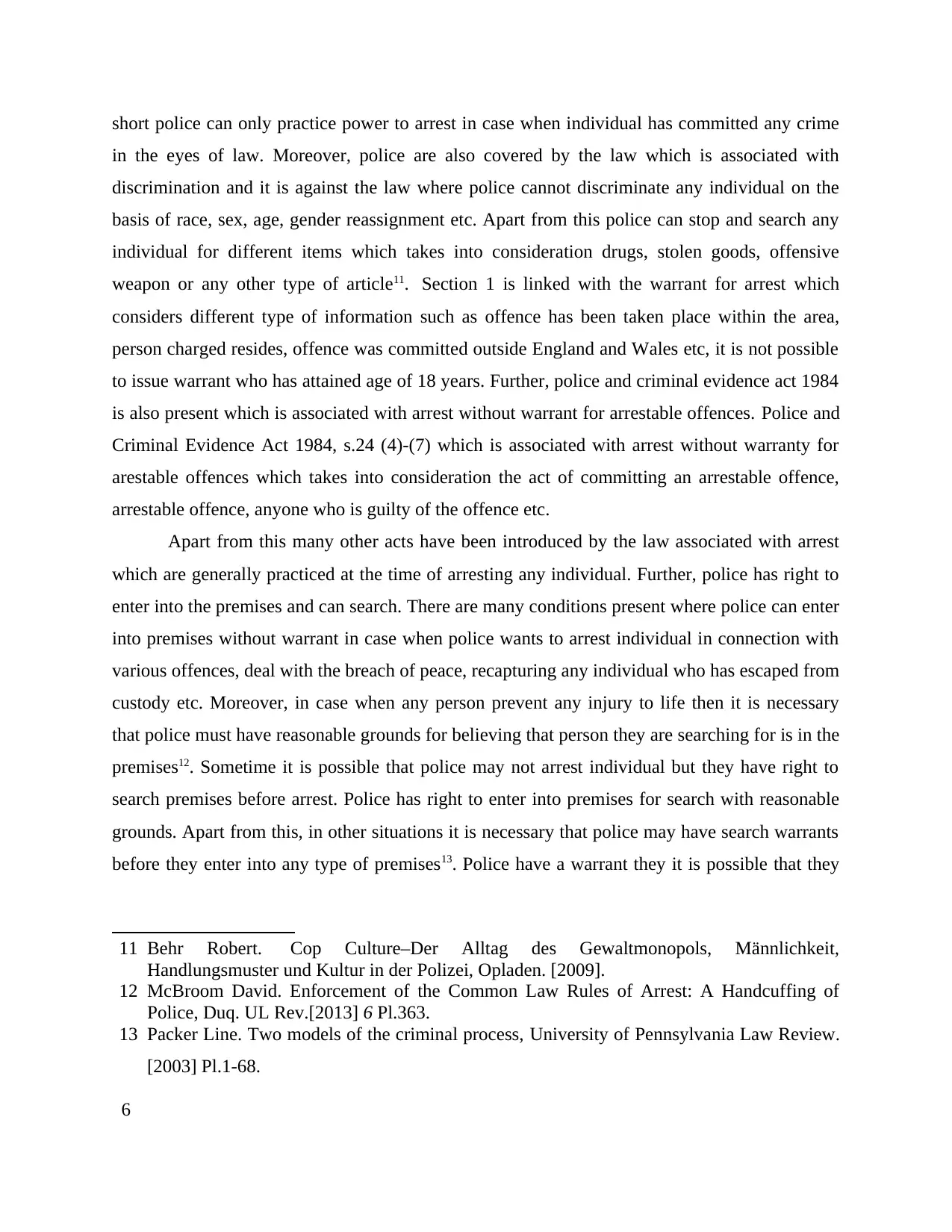
short police can only practice power to arrest in case when individual has committed any crime
in the eyes of law. Moreover, police are also covered by the law which is associated with
discrimination and it is against the law where police cannot discriminate any individual on the
basis of race, sex, age, gender reassignment etc. Apart from this police can stop and search any
individual for different items which takes into consideration drugs, stolen goods, offensive
weapon or any other type of article11. Section 1 is linked with the warrant for arrest which
considers different type of information such as offence has been taken place within the area,
person charged resides, offence was committed outside England and Wales etc, it is not possible
to issue warrant who has attained age of 18 years. Further, police and criminal evidence act 1984
is also present which is associated with arrest without warrant for arrestable offences. Police and
Criminal Evidence Act 1984, s.24 (4)-(7) which is associated with arrest without warranty for
arestable offences which takes into consideration the act of committing an arrestable offence,
arrestable offence, anyone who is guilty of the offence etc.
Apart from this many other acts have been introduced by the law associated with arrest
which are generally practiced at the time of arresting any individual. Further, police has right to
enter into the premises and can search. There are many conditions present where police can enter
into premises without warrant in case when police wants to arrest individual in connection with
various offences, deal with the breach of peace, recapturing any individual who has escaped from
custody etc. Moreover, in case when any person prevent any injury to life then it is necessary
that police must have reasonable grounds for believing that person they are searching for is in the
premises12. Sometime it is possible that police may not arrest individual but they have right to
search premises before arrest. Police has right to enter into premises for search with reasonable
grounds. Apart from this, in other situations it is necessary that police may have search warrants
before they enter into any type of premises13. Police have a warrant they it is possible that they
11 Behr Robert. Cop Culture–Der Alltag des Gewaltmonopols, Männlichkeit,
Handlungsmuster und Kultur in der Polizei, Opladen. [2009].
12 McBroom David. Enforcement of the Common Law Rules of Arrest: A Handcuffing of
Police, Duq. UL Rev.[2013] 6 Pl.363.
13 Packer Line. Two models of the criminal process, University of Pennsylvania Law Review.
[2003] Pl.1-68.
6
in the eyes of law. Moreover, police are also covered by the law which is associated with
discrimination and it is against the law where police cannot discriminate any individual on the
basis of race, sex, age, gender reassignment etc. Apart from this police can stop and search any
individual for different items which takes into consideration drugs, stolen goods, offensive
weapon or any other type of article11. Section 1 is linked with the warrant for arrest which
considers different type of information such as offence has been taken place within the area,
person charged resides, offence was committed outside England and Wales etc, it is not possible
to issue warrant who has attained age of 18 years. Further, police and criminal evidence act 1984
is also present which is associated with arrest without warrant for arrestable offences. Police and
Criminal Evidence Act 1984, s.24 (4)-(7) which is associated with arrest without warranty for
arestable offences which takes into consideration the act of committing an arrestable offence,
arrestable offence, anyone who is guilty of the offence etc.
Apart from this many other acts have been introduced by the law associated with arrest
which are generally practiced at the time of arresting any individual. Further, police has right to
enter into the premises and can search. There are many conditions present where police can enter
into premises without warrant in case when police wants to arrest individual in connection with
various offences, deal with the breach of peace, recapturing any individual who has escaped from
custody etc. Moreover, in case when any person prevent any injury to life then it is necessary
that police must have reasonable grounds for believing that person they are searching for is in the
premises12. Sometime it is possible that police may not arrest individual but they have right to
search premises before arrest. Police has right to enter into premises for search with reasonable
grounds. Apart from this, in other situations it is necessary that police may have search warrants
before they enter into any type of premises13. Police have a warrant they it is possible that they
11 Behr Robert. Cop Culture–Der Alltag des Gewaltmonopols, Männlichkeit,
Handlungsmuster und Kultur in der Polizei, Opladen. [2009].
12 McBroom David. Enforcement of the Common Law Rules of Arrest: A Handcuffing of
Police, Duq. UL Rev.[2013] 6 Pl.363.
13 Packer Line. Two models of the criminal process, University of Pennsylvania Law Review.
[2003] Pl.1-68.
6
⊘ This is a preview!⊘
Do you want full access?
Subscribe today to unlock all pages.

Trusted by 1+ million students worldwide
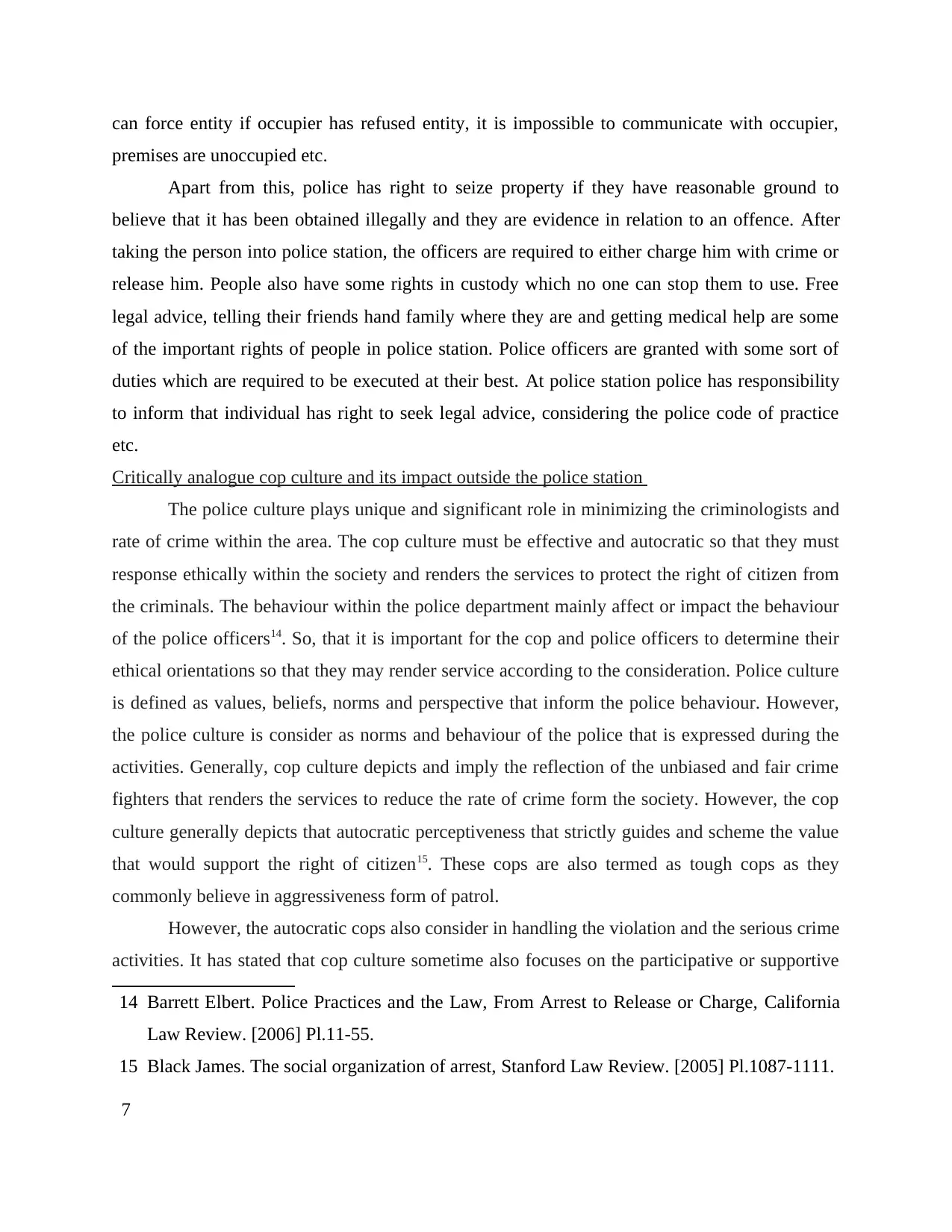
can force entity if occupier has refused entity, it is impossible to communicate with occupier,
premises are unoccupied etc.
Apart from this, police has right to seize property if they have reasonable ground to
believe that it has been obtained illegally and they are evidence in relation to an offence. After
taking the person into police station, the officers are required to either charge him with crime or
release him. People also have some rights in custody which no one can stop them to use. Free
legal advice, telling their friends hand family where they are and getting medical help are some
of the important rights of people in police station. Police officers are granted with some sort of
duties which are required to be executed at their best. At police station police has responsibility
to inform that individual has right to seek legal advice, considering the police code of practice
etc.
Critically analogue cop culture and its impact outside the police station
The police culture plays unique and significant role in minimizing the criminologists and
rate of crime within the area. The cop culture must be effective and autocratic so that they must
response ethically within the society and renders the services to protect the right of citizen from
the criminals. The behaviour within the police department mainly affect or impact the behaviour
of the police officers14. So, that it is important for the cop and police officers to determine their
ethical orientations so that they may render service according to the consideration. Police culture
is defined as values, beliefs, norms and perspective that inform the police behaviour. However,
the police culture is consider as norms and behaviour of the police that is expressed during the
activities. Generally, cop culture depicts and imply the reflection of the unbiased and fair crime
fighters that renders the services to reduce the rate of crime form the society. However, the cop
culture generally depicts that autocratic perceptiveness that strictly guides and scheme the value
that would support the right of citizen15. These cops are also termed as tough cops as they
commonly believe in aggressiveness form of patrol.
However, the autocratic cops also consider in handling the violation and the serious crime
activities. It has stated that cop culture sometime also focuses on the participative or supportive
14 Barrett Elbert. Police Practices and the Law, From Arrest to Release or Charge, California
Law Review. [2006] Pl.11-55.
15 Black James. The social organization of arrest, Stanford Law Review. [2005] Pl.1087-1111.
7
premises are unoccupied etc.
Apart from this, police has right to seize property if they have reasonable ground to
believe that it has been obtained illegally and they are evidence in relation to an offence. After
taking the person into police station, the officers are required to either charge him with crime or
release him. People also have some rights in custody which no one can stop them to use. Free
legal advice, telling their friends hand family where they are and getting medical help are some
of the important rights of people in police station. Police officers are granted with some sort of
duties which are required to be executed at their best. At police station police has responsibility
to inform that individual has right to seek legal advice, considering the police code of practice
etc.
Critically analogue cop culture and its impact outside the police station
The police culture plays unique and significant role in minimizing the criminologists and
rate of crime within the area. The cop culture must be effective and autocratic so that they must
response ethically within the society and renders the services to protect the right of citizen from
the criminals. The behaviour within the police department mainly affect or impact the behaviour
of the police officers14. So, that it is important for the cop and police officers to determine their
ethical orientations so that they may render service according to the consideration. Police culture
is defined as values, beliefs, norms and perspective that inform the police behaviour. However,
the police culture is consider as norms and behaviour of the police that is expressed during the
activities. Generally, cop culture depicts and imply the reflection of the unbiased and fair crime
fighters that renders the services to reduce the rate of crime form the society. However, the cop
culture generally depicts that autocratic perceptiveness that strictly guides and scheme the value
that would support the right of citizen15. These cops are also termed as tough cops as they
commonly believe in aggressiveness form of patrol.
However, the autocratic cops also consider in handling the violation and the serious crime
activities. It has stated that cop culture sometime also focuses on the participative or supportive
14 Barrett Elbert. Police Practices and the Law, From Arrest to Release or Charge, California
Law Review. [2006] Pl.11-55.
15 Black James. The social organization of arrest, Stanford Law Review. [2005] Pl.1087-1111.
7
Paraphrase This Document
Need a fresh take? Get an instant paraphrase of this document with our AI Paraphraser
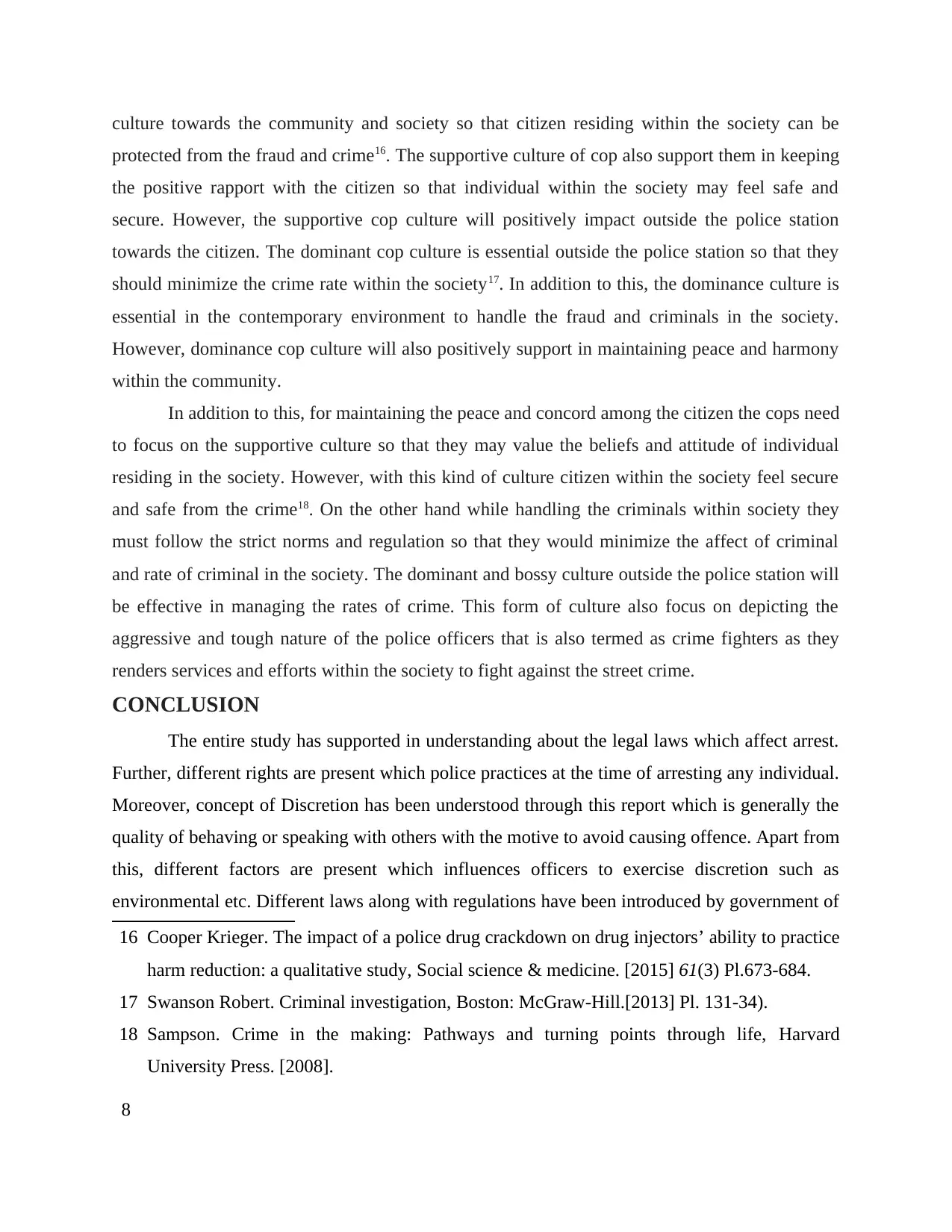
culture towards the community and society so that citizen residing within the society can be
protected from the fraud and crime16. The supportive culture of cop also support them in keeping
the positive rapport with the citizen so that individual within the society may feel safe and
secure. However, the supportive cop culture will positively impact outside the police station
towards the citizen. The dominant cop culture is essential outside the police station so that they
should minimize the crime rate within the society17. In addition to this, the dominance culture is
essential in the contemporary environment to handle the fraud and criminals in the society.
However, dominance cop culture will also positively support in maintaining peace and harmony
within the community.
In addition to this, for maintaining the peace and concord among the citizen the cops need
to focus on the supportive culture so that they may value the beliefs and attitude of individual
residing in the society. However, with this kind of culture citizen within the society feel secure
and safe from the crime18. On the other hand while handling the criminals within society they
must follow the strict norms and regulation so that they would minimize the affect of criminal
and rate of criminal in the society. The dominant and bossy culture outside the police station will
be effective in managing the rates of crime. This form of culture also focus on depicting the
aggressive and tough nature of the police officers that is also termed as crime fighters as they
renders services and efforts within the society to fight against the street crime.
CONCLUSION
The entire study has supported in understanding about the legal laws which affect arrest.
Further, different rights are present which police practices at the time of arresting any individual.
Moreover, concept of Discretion has been understood through this report which is generally the
quality of behaving or speaking with others with the motive to avoid causing offence. Apart from
this, different factors are present which influences officers to exercise discretion such as
environmental etc. Different laws along with regulations have been introduced by government of
16 Cooper Krieger. The impact of a police drug crackdown on drug injectors’ ability to practice
harm reduction: a qualitative study, Social science & medicine. [2015] 61(3) Pl.673-684.
17 Swanson Robert. Criminal investigation, Boston: McGraw-Hill.[2013] Pl. 131-34).
18 Sampson. Crime in the making: Pathways and turning points through life, Harvard
University Press. [2008].
8
protected from the fraud and crime16. The supportive culture of cop also support them in keeping
the positive rapport with the citizen so that individual within the society may feel safe and
secure. However, the supportive cop culture will positively impact outside the police station
towards the citizen. The dominant cop culture is essential outside the police station so that they
should minimize the crime rate within the society17. In addition to this, the dominance culture is
essential in the contemporary environment to handle the fraud and criminals in the society.
However, dominance cop culture will also positively support in maintaining peace and harmony
within the community.
In addition to this, for maintaining the peace and concord among the citizen the cops need
to focus on the supportive culture so that they may value the beliefs and attitude of individual
residing in the society. However, with this kind of culture citizen within the society feel secure
and safe from the crime18. On the other hand while handling the criminals within society they
must follow the strict norms and regulation so that they would minimize the affect of criminal
and rate of criminal in the society. The dominant and bossy culture outside the police station will
be effective in managing the rates of crime. This form of culture also focus on depicting the
aggressive and tough nature of the police officers that is also termed as crime fighters as they
renders services and efforts within the society to fight against the street crime.
CONCLUSION
The entire study has supported in understanding about the legal laws which affect arrest.
Further, different rights are present which police practices at the time of arresting any individual.
Moreover, concept of Discretion has been understood through this report which is generally the
quality of behaving or speaking with others with the motive to avoid causing offence. Apart from
this, different factors are present which influences officers to exercise discretion such as
environmental etc. Different laws along with regulations have been introduced by government of
16 Cooper Krieger. The impact of a police drug crackdown on drug injectors’ ability to practice
harm reduction: a qualitative study, Social science & medicine. [2015] 61(3) Pl.673-684.
17 Swanson Robert. Criminal investigation, Boston: McGraw-Hill.[2013] Pl. 131-34).
18 Sampson. Crime in the making: Pathways and turning points through life, Harvard
University Press. [2008].
8

UK which are followed at the time of arresting any individual but it has to be ensured that
individual has committed crime.
9
individual has committed crime.
9
⊘ This is a preview!⊘
Do you want full access?
Subscribe today to unlock all pages.

Trusted by 1+ million students worldwide
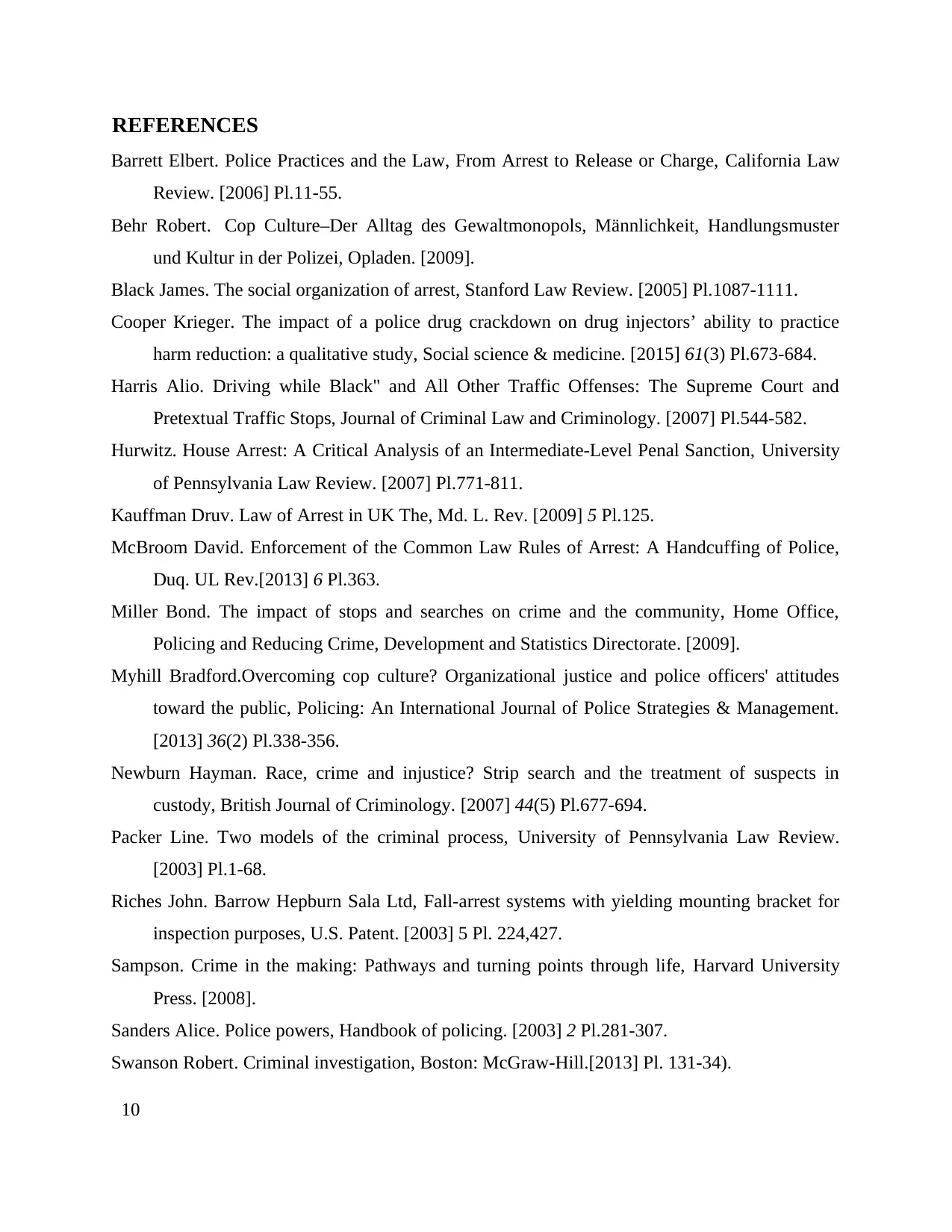
REFERENCES
Barrett Elbert. Police Practices and the Law, From Arrest to Release or Charge, California Law
Review. [2006] Pl.11-55.
Behr Robert. Cop Culture–Der Alltag des Gewaltmonopols, Männlichkeit, Handlungsmuster
und Kultur in der Polizei, Opladen. [2009].
Black James. The social organization of arrest, Stanford Law Review. [2005] Pl.1087-1111.
Cooper Krieger. The impact of a police drug crackdown on drug injectors’ ability to practice
harm reduction: a qualitative study, Social science & medicine. [2015] 61(3) Pl.673-684.
Harris Alio. Driving while Black" and All Other Traffic Offenses: The Supreme Court and
Pretextual Traffic Stops, Journal of Criminal Law and Criminology. [2007] Pl.544-582.
Hurwitz. House Arrest: A Critical Analysis of an Intermediate-Level Penal Sanction, University
of Pennsylvania Law Review. [2007] Pl.771-811.
Kauffman Druv. Law of Arrest in UK The, Md. L. Rev. [2009] 5 Pl.125.
McBroom David. Enforcement of the Common Law Rules of Arrest: A Handcuffing of Police,
Duq. UL Rev.[2013] 6 Pl.363.
Miller Bond. The impact of stops and searches on crime and the community, Home Office,
Policing and Reducing Crime, Development and Statistics Directorate. [2009].
Myhill Bradford.Overcoming cop culture? Organizational justice and police officers' attitudes
toward the public, Policing: An International Journal of Police Strategies & Management.
[2013] 36(2) Pl.338-356.
Newburn Hayman. Race, crime and injustice? Strip search and the treatment of suspects in
custody, British Journal of Criminology. [2007] 44(5) Pl.677-694.
Packer Line. Two models of the criminal process, University of Pennsylvania Law Review.
[2003] Pl.1-68.
Riches John. Barrow Hepburn Sala Ltd, Fall-arrest systems with yielding mounting bracket for
inspection purposes, U.S. Patent. [2003] 5 Pl. 224,427.
Sampson. Crime in the making: Pathways and turning points through life, Harvard University
Press. [2008].
Sanders Alice. Police powers, Handbook of policing. [2003] 2 Pl.281-307.
Swanson Robert. Criminal investigation, Boston: McGraw-Hill.[2013] Pl. 131-34).
10
Barrett Elbert. Police Practices and the Law, From Arrest to Release or Charge, California Law
Review. [2006] Pl.11-55.
Behr Robert. Cop Culture–Der Alltag des Gewaltmonopols, Männlichkeit, Handlungsmuster
und Kultur in der Polizei, Opladen. [2009].
Black James. The social organization of arrest, Stanford Law Review. [2005] Pl.1087-1111.
Cooper Krieger. The impact of a police drug crackdown on drug injectors’ ability to practice
harm reduction: a qualitative study, Social science & medicine. [2015] 61(3) Pl.673-684.
Harris Alio. Driving while Black" and All Other Traffic Offenses: The Supreme Court and
Pretextual Traffic Stops, Journal of Criminal Law and Criminology. [2007] Pl.544-582.
Hurwitz. House Arrest: A Critical Analysis of an Intermediate-Level Penal Sanction, University
of Pennsylvania Law Review. [2007] Pl.771-811.
Kauffman Druv. Law of Arrest in UK The, Md. L. Rev. [2009] 5 Pl.125.
McBroom David. Enforcement of the Common Law Rules of Arrest: A Handcuffing of Police,
Duq. UL Rev.[2013] 6 Pl.363.
Miller Bond. The impact of stops and searches on crime and the community, Home Office,
Policing and Reducing Crime, Development and Statistics Directorate. [2009].
Myhill Bradford.Overcoming cop culture? Organizational justice and police officers' attitudes
toward the public, Policing: An International Journal of Police Strategies & Management.
[2013] 36(2) Pl.338-356.
Newburn Hayman. Race, crime and injustice? Strip search and the treatment of suspects in
custody, British Journal of Criminology. [2007] 44(5) Pl.677-694.
Packer Line. Two models of the criminal process, University of Pennsylvania Law Review.
[2003] Pl.1-68.
Riches John. Barrow Hepburn Sala Ltd, Fall-arrest systems with yielding mounting bracket for
inspection purposes, U.S. Patent. [2003] 5 Pl. 224,427.
Sampson. Crime in the making: Pathways and turning points through life, Harvard University
Press. [2008].
Sanders Alice. Police powers, Handbook of policing. [2003] 2 Pl.281-307.
Swanson Robert. Criminal investigation, Boston: McGraw-Hill.[2013] Pl. 131-34).
10
Paraphrase This Document
Need a fresh take? Get an instant paraphrase of this document with our AI Paraphraser

Waddington Stenson. In proportion race, and police stop and search, British journal of
criminology. [2004] 44(6) Pl.889-914.
Yuan Shan. G0/G1 arrest and apoptosis induced by SARS-CoV 3b protein in transfected cells,
Virol. [2005] 2 Pl.198-0024.
11
criminology. [2004] 44(6) Pl.889-914.
Yuan Shan. G0/G1 arrest and apoptosis induced by SARS-CoV 3b protein in transfected cells,
Virol. [2005] 2 Pl.198-0024.
11
1 out of 11
Related Documents
Your All-in-One AI-Powered Toolkit for Academic Success.
+13062052269
info@desklib.com
Available 24*7 on WhatsApp / Email
![[object Object]](/_next/static/media/star-bottom.7253800d.svg)
Unlock your academic potential
Copyright © 2020–2026 A2Z Services. All Rights Reserved. Developed and managed by ZUCOL.




